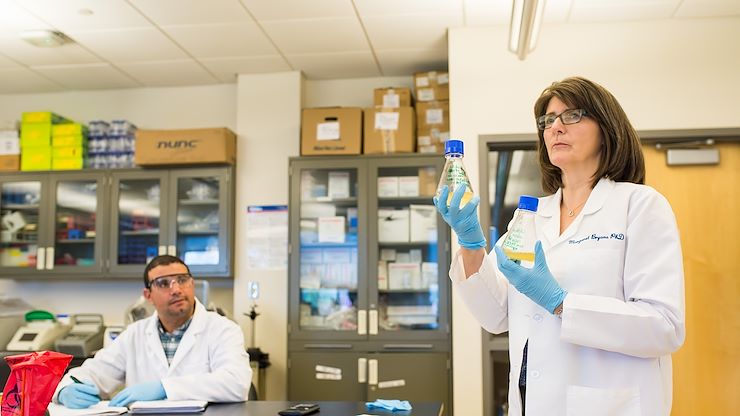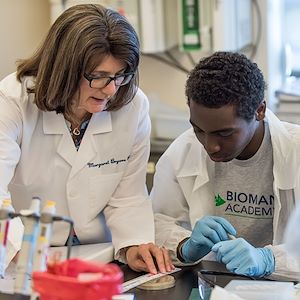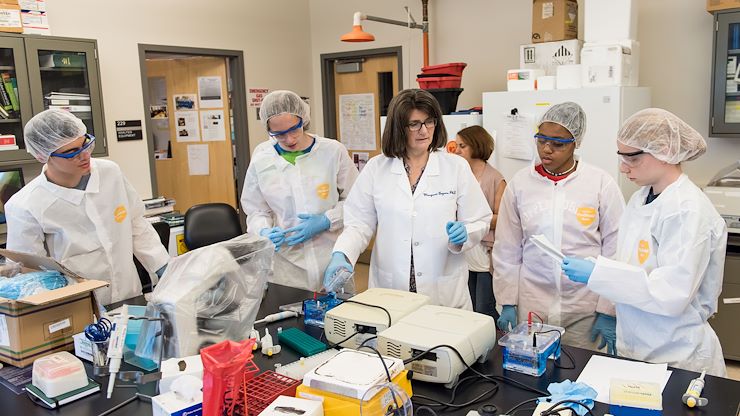
MCCC Biology Associate Professor and Biotechnology Program Coordinator Dr. Margaret Bryans will be working with two Delaware State University faculty members, Drs. Derrick and Latia Scott, to develop the biopharmaceutical Workforce Outreach, Research, Diversity, and Education Institute.
A Montgomery County Community College professor is using her expertise in biomanufacturing and biotechnology to help promote racial and ethnic diversity among the next generation of scientists in the field.
Dr. Margaret Bryans, biology associate professor and coordinator of the biotechnology program at MCCC, will work with two Delaware State University (DESU) faculty members, Drs. Derrick and Latia Scott, to develop the biopharmaceutical Workforce Outreach, Research, Diversity, and Education (WORDE) Institute.
The new program at the public, historically black university will work to increase minority representation in the biopharmaceutical industry by training graduates to a level that will allow them to seamlessly enter the workforce. The project is being funded through a $750,739 grant by the National Institute for Innovation in Manufacturing Biopharmaceuticals (NIIMBL).
“She's [Dr. Margaret Bryans] really become an expert in the field not just regionally, but nationally. As a college, that’s something we’re incredibly proud of. It really shows we’ve developed a niche and identified an area of strength that we can use to benefit not only the College but also Montgomery County and southeastern Pennsylvania," said Dr. James Bretz, MCCC Dean of Science, Technology, Engineering and Mathematics.
Dr. Derrick Scott is assistant professor of biological sciences at DESU, and his wife Dr. LaTia Scott, associate professor of biological sciences, are co-principal investigators of the grant and leading the initiative. Representatives from the U.S.-based multinational pharmaceutical company, Merck & Co., and faculty at Solano Community College, in California, are also involved with the project.
Bryans will train DESU faculty in biomanufacturing processes and advise in the development of the curriculum for the new program.
“This is a great opportunity for us to be involved in this important initiative, to work with DESU faculty and help develop the new curriculum that will train a future workforce of diverse and skilled individuals for the biopharmaceutical industry” she said.
The first phase of the project will provide faculty with in-depth knowledge of the biomanufacturing industry. Bryans explained the growing biomanufacturing field focuses on creating injectable biotherapeutics, such as insulin, to treat diabetes, and antibodies, to fight off different types of cancer or viral infections.
As Principal Investigator for the Northeast Biomanufacturing Center and Collaborative (NBC2), Bryans has developed training materials and workshops as well as curriculum and educational materials to prepare students to enter the biomanufacturing industry.
In fact, MCCC offers a 16-credit biotechnology and biomanufacturing certificate of completion program for students who have an Associate or Bachelor of Science degree that can help them enter this field.
Bryans was recruited into the project, not only for her expertise, but also because
of her experience as a past recipient of several grants from the National Science
Foundation  (NSF). Over a 10-year period, the NSF has granted over $10 million (including its
most recent grant of $2.6 million in 2016) to NBC2, a consortium of six community
colleges that work collaboratively to mentor programs, design curriculum and provide
training opportunities for technicians for the biomanufacturing industry. At MCCC,
Bryans has developed open source curriculum and training workshops for community college
instructors, as well as summer workshops for area high school teachers and programs
for students to introduce them to careers in biomanufacturing.
(NSF). Over a 10-year period, the NSF has granted over $10 million (including its
most recent grant of $2.6 million in 2016) to NBC2, a consortium of six community
colleges that work collaboratively to mentor programs, design curriculum and provide
training opportunities for technicians for the biomanufacturing industry. At MCCC,
Bryans has developed open source curriculum and training workshops for community college
instructors, as well as summer workshops for area high school teachers and programs
for students to introduce them to careers in biomanufacturing.
With the grant to DESU, Bryans said the project will be completed in phases.
“The first phase is to get the faculty up to speed in the processes and techniques the students will be learning, understand the kind of equipment needed, and get ideas for putting the courses together,” said Bryans. “That’s where we come in.”
The plan is to have six faculty from DESU attend a hands-on workshop at MCCC’s Central Campus in Blue Bell.
“We are one of several professional development activities the DESU’s faculty is going to attend in the first phase of the overall WORDE initiative,” said Bryans.
Faculty will spend a week at Merck, in order to learn more about the biopharmaceutical industry. Then they’ll travel to North Carolina State University to study at the Biomanufacturing Training and Education Center, (BTEC) to learn more about biomanufacturing.
Once the DESU faculty are trained, faculty at Solano Community College and MCCC will help develop curriculum for the eventual classes at DESU.
“We’ll do that by sharing our curriculum and expertise, and advising on their equipment set up,” said Bryans.
 Bryans’ help with the new initiative has already garnered praise, including from MCCC
administrators.
Bryans’ help with the new initiative has already garnered praise, including from MCCC
administrators.
“I think it’s a great opportunity, not just for the College, but for Delaware State. What it really shows is the program that Maggie developed through her NSF grant, the NBC2 program, has really put us on the map as a leader in biomanufacturing and biotechnology,” said Dr. James Bretz, Dean of Science, Technology, Engineering and Math. “Maggie is sought after for information, ideas and guidance on how to set up programs. They look to her for curricular advice. She’s really become an expert in the field not just regionally, but nationally. As a college, that’s something we’re incredibly proud of. It really shows we’ve developed a niche and identified an area of strength that we can use to benefit not only the College but also Montgomery County and southeastern Pennsylvania.
“I’m really excited for this program, as well as other the collaborations Maggie is part of through NIIMBL that have really shown our strength in this area and the strength of the program that Maggie has developed.”
